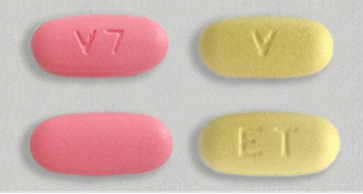Dual Prevention Pill

The Dual Prevention Pill (DPP) is currently being developed for daily use to prevent both HIV and pregnancy. It is one of several multipurpose prevention technologies (MPTs)–a single product designed to address multiple health needs–in the pipeline. Below are details on its distinct characteristics, information on the DPP Consortium that is preparing for its introduction, and resources to learn more.
The Basics
- A daily oral pill which prevents both HIV and pregnancy.
- Combines two already-approved products—oral PrEP (tenofovir disoproxil fumarate and emtricitabine, or TDF/FTC) and oral contraception (ethinyl estradiol and levonorgestrel, or EE/LNG).
- Developed by Viatris.
- Successfully demonstrated bioequivalence, which ensures the active ingredients in the combined pill are absorbed in the blood at the same rate as when oral PrEP and oral contraception are taken separately.
- Viatris could submit the DPP for regulatory approval in 2024, with first approval as early as late 2025.
- Planned for initial introduction in East and Southern Africa, where 68 percent of new HIV infections are amongst women of reproductive age (WRA), and 15 percent of WRA have unmet need for family planning.
- Could increase oral PrEP uptake and help mitigate PrEP stigma by combining PrEP with contraception, which is more commonly used.
- If approved, the DPP will be the first commercially-available MPT since condoms—and the first MPT containing PrEP.
The DPP Consortium
The DPP Consortium was formed in 2019 to accelerate the development and introduction of a DPP for prevention of HIV and pregnancy. A coalition of organizations, including AVAC, the Clinton Health Access Initiative (CHAI), Viatris, the Population Council, and Medicines360 lead the DPP project. These efforts are supported by the Children’s Investment Fund Foundation (CIFF), Gates Foundation, US Agency for International Development (USAID), and HIV Prevention Trials Network (HPTN). Click here to learn more about the project.
The DPP Consortium’s Geographic Scope
Once approved, DPP introduction will be prioritized in settings that demonstrate need (high HIV incidence and high unmet need for modern contraception), potential demand (current oral PrEP and contraceptive use) and enabling policy and regulatory environments.
Early estimates indicate a potential market size of 251,000-1.25 million women in 15 countries in Africa. Kenya, South Africa and Zimbabwe are expected to be early adopters of the DPP and are focus countries for evidence generation.
Key Resources
Overview
- FAQs on the DPP
- Developing and Introducing a Dual Prevention Pill (project briefer)
- Frontiers in Reproductive Health special issue: MPTs for HIV, STIs and Pregnancies
Market Preparation and Introduction
- Market Preparation and Introduction Strategy for the DPP and executive summary (Updated August 2023)
- IAS 2022 Satellite Session: How Market Preparation for the Dual Prevention Pill is Reimagining Prevention Programs for a Future with MPTs (Slides/Recording)
- Consultation with FP/SRH Stakeholders on the DPP and meeting summary (2022)
- IAS 2021 Satellite Session: Bringing the Dual Prevention Pill to Market: Opportunities for HIV and Pregnancy Prevention and Implications for Future MPTs
End-User Research
- “Killing two birds with one stone” – a qualitative study on women’s perspectives on the dual prevention pill in Johannesburg, South Africa (2024)
- How might we motivate uptake of the Dual Prevention Pill? Findings from human-centered design research with potential end users, male partners, and healthcare providers (2023)
- DPP Audience & Provider Insights for the DPP Research and Marketing Plan: Phase 1 Research Findings (Report/Slides) (2022)
- Summary of Insights and Recommendations on the DPP from End-User Research in South Africa and Zimbabwehttps://prepwatch.org/wp-content/uploads/2021/08/2021_07_30-End-user-findings-summary_public.pdf (2021)
- Recommendations and Solutions from Human-Centered Design Research on the DPP (2021)
Service Delivery
- Harnessing private sector strategies for family planning to deliver the Dual Prevention Pill, the first multipurpose prevention technology with pre-exposure prophylaxis, in an expanding HIV prevention landscape (2024)
- Equipping providers to offer novel MPTs: Developing counseling messages for the Dual Prevention Pill in clinical studies and beyond (2023)
- Private Sector Delivery Strategy for the Dual Prevention Pill: Kenya and Zimbabwe (2023)
- Webinar: Private sector delivery opportunities for the DPP: Lessons from FP for the introduction of MPTs (Slides/Recording/Notes) (2022)
- Private Sector Delivery Opportunities for the DPP: Kenya, South Africa, and Zimbabwe (2022)
Health Systems
- Cost-effectiveness of the dual prevention pill for contraception and HIV pre-exposure prophylaxis (2023)
- M&E Needs for Introducing Novel MPTs (2022)
- Global Procurement of the DPP: Informing the Introduction of MPTs (2022)
Contact Information
Please contact [email protected] with any questions or requests related to this project.